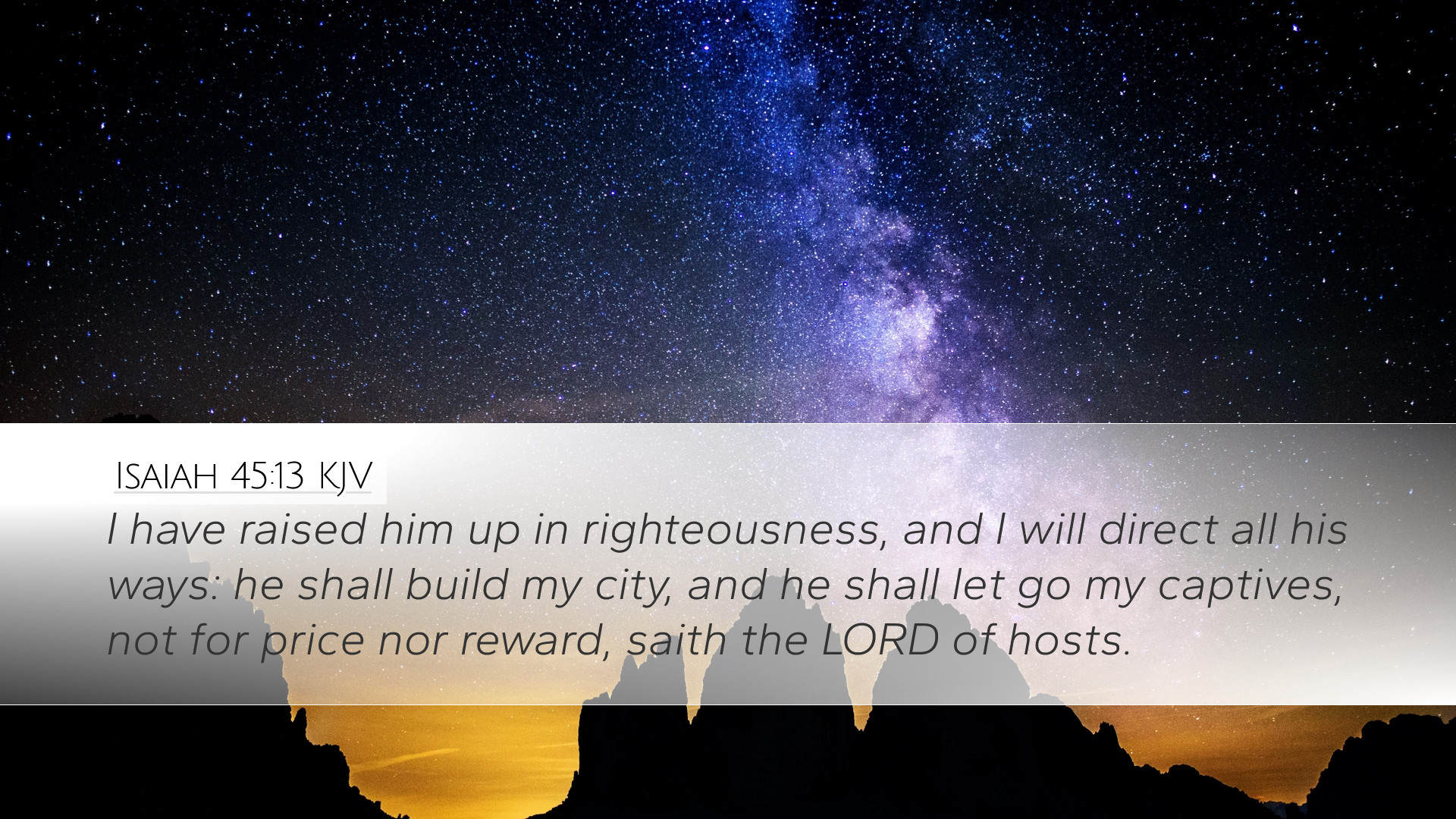Commentary on Isaiah 45:13
Isaiah 45:13 states: "I have raised him up in righteousness, and I will direct all his ways: he shall build my city, and he shall let go my captives, not for price nor reward, saith the Lord of hosts." This verse serves as a profound declaration of God’s sovereignty and purpose in history, illustrating God’s use of instruments from outside Israel to fulfill His divine plans.
Contextual Analysis
The book of Isaiah addresses a range of themes, central among them is the theme of God’s sovereignty over all nations and His ultimate purpose of redemption and restoration. These themes become particularly prominent in Isaiah 45, where God speaks through the prophet regarding Cyrus, the Persian king.
Divine Sovereignty
Matthew Henry emphasizes God’s absolute sovereignty in this passage, noting that it is God who raises up kings and directs their paths:
- God’s Initiative: “I have raised him up in righteousness” indicates that God is the author of Cyrus’ rise to power. This act is grounded in His righteousness, affirming that God's choices are always just and purposeful.
- Divine Guidance: The phrase “I will direct all his ways” demonstrates God’s hand in the governance of nations. Even in the hands of a foreign king, God remains in control, ensuring His divine will is accomplished.
Fulfillment of Prophecy
Albert Barnes points out that this declaration about Cyrus is not merely a historical account but a prophecy fulfilled. Cyrus became instrumental in the release of Jewish captives and the rebuilding of Jerusalem:
- Building the City: The commission to “build my city” refers to Cyrus’ decree that allowed the Israelites to return to Jerusalem and rebuild the temple, thus restoring worship and community.
- Release of Captives: The mention of “let go my captives, not for price nor reward” indicates a free act of liberation. Cyrus' actions were not motivated by greed but by God’s sovereign design, which reflects the ultimate purpose of restoration for His people.
Theological Implications
Adam Clarke elaborates on the theological significance of this verse for understanding God's ways with humanity:
- Inclusivity of God’s Plan: God’s use of a pagan ruler illustrates His inclusive approach to salvation history, indicating that He can use anyone, regardless of their background, to accomplish His will.
- Righteous Leadership: The phrase “in righteousness” highlights that even the decisions of secular leaders can be aligned with God's justice, signifying that God’s righteousness transcends human systems.
Pastoral Applications
For pastors and spiritual leaders, this verse offers crucial insights into God's plans for individuals and nations:
- Trust in God’s Providence: Even when circumstances seem dire, this passage encourages believers to trust in God's providential hand in historical and personal events.
- Hope for Restoration: This assurance of restoration serves as a powerful reminder of God's commitment to His people, offering hope for those in despair.
- Engagement with Society: It challenges Christians to recognize and affirm God’s sovereignty even in secular spheres, encouraging them to engage with the culture around them with a belief in God’s overarching purpose.
Conclusion
Isaiah 45:13 is a testament to God's ability to raise leaders and orchestrate events according to His sovereign will. The insights extracted from historical and theological commentaries affirm that God operates within and beyond traditional boundaries to fulfill His plans of redemption. This verse not only serves as an encouragement for individual believers but also as a clarion call for corporate engagement in faith.”


